Face-Off: Resident Evil: Revelations
Nintendo 3DS vs. PC and current-gen consoles.
| Xbox 360 | PlayStation 3 | PC | |
|---|---|---|---|
| Disc Size | 7.8GB | 11.5GB | Steam Download |
| Install | 7.8GB (optional) | - | 7.96GB |
| Surround Support | Dolby Digital (stereo) | Dolby Digital (stereo) | Stereo |
How about something a little different? A Digital Foundry Face-Off that serves us the usual HD platforms with a little extra Wii U spice - all lined up and compared to the original Nintendo 3DS release. It's a fascinating, one-of-a-kind comparison that should see the handheld hardware comprehensively out-classed, out-quaffed and generally out-done in every way. And yet, despite the enormous gulf in processing power (think of the 3DS as Dreamcast-level hardware with some more modern GPU features) we came away rather impressed with the vintage handheld game and it remains one of the most impressive technological showcases for Nintendo's portable system.
Designed specifically for the 3DS and engineered around the strengths and weaknesses of the hardware, Resident Evil: Revelations is a far lower-key affair than recent instalments that delivers the claustrophobic environments and more traditional survival horror gameplay traditionally expected from the franchise. The enclosed locales allow Capcom to create detailed characters and locations, leaving enough GPU power for an impressive per-pixel lighting scheme and a range of visual effects that demonstrates the capabilities of Nintendo's low-spec handheld without compromising too much on performance.
Released at a time when 3DS adoption was still very low, the game failed to find the kind of success expected from one of gaming's biggest franchises. With the disappointment of Resident Evil 6 still lurking close by, Revelations gets a second chance to impress via a reworked HD edition, featuring upgraded graphics and expanded gameplay modes. For a game built around modest hardware, how well does it translate to vastly more powerful home console hardware? Are we dealing with little more than the 3DS game running at a higher resolution, or do the graphical upgrades do justice to what is the first traditional Resident Evil game to hit home systems in years?
Let's start by taking a look at the console and PC releases, kicking off with a mammoth quad-format comparison gallery and more head-to-head videos than you could possibly imagine (well, OK, six).
Alternative comparisons:
- Resident Evil: Revelations - Wii U vs. PS3
- Resident Evil: Revelations - Wii U vs. PC
- Resident Evil: Revelations - Xbox 360 vs. PS3
- Resident Evil: Revelations - Xbox 360 vs. PC
- Resident Evil: Revelations - PS3 vs. PC
Image quality is clearly a step up from Resident Evil 6. Console owners get a native 720p presentation along with anti-aliasing provided by an implementation of the popular FXAA solution. This gives the game a clean look that is mostly free from the more obvious edge artifacts, and surprisingly texture blur is minimal. The artwork appears clear and unmolested - or rather, at least as much as the game's variable texture resolution allows.
PC users can opt for higher-quality versions of the anti-aliasing effect that provides even better coverage with no additional penalty to artwork clarity - the highest-end setting being FXAA3 HQ, which we quickly settled upon. The end result is a smooth image that looks very clean when running in very high resolutions, and the use of FXAA really comes into its own at 1080p and higher resolutions, where the sub-pixel crawling issue inherent with most post-process AA is far less of an issue.
Beyond the boost in anti-aliasing, the level of graphical consistency remains stable across all consoles and indeed PC. Overall, meaningful differences are few and far between, limited to an off-set bias that sees shadows positioned in slightly different places on PS3 and Wii U (360 and PC are a match) and the use of higher-quality assets on the PC game (higher-resolution textures and normal maps can be found dotted across a few surfaces, but their appearances are infrequent to say the least).


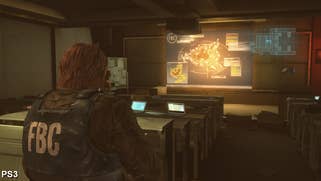
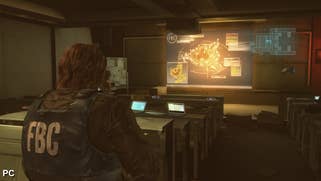

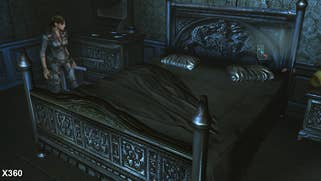






Despite its low-spec handheld heritage, Resident Evil: Revelations generally holds up well transplanted over to home consoles and the PC. Running in much higher resolutions than the original 3DS game, the enclosed environments don't appear too boxy, while the characters feature enough geometry complexity and normal-mapping to keep them looking rounded and reasonably detailed. Revelations certainly won't pass as a dedicated current-gen game, but is a class apart from the sort of results we saw on the last generation of consoles.
Away from gameplay, a look at the cut-scenes shows up some slightly more visible compression issues on the 360 and PC (PS3 and Wii U are identical) but this mainly appears to be restricted to the CG-based video sequences. However, the bulk of the game's cinematics are rendered offline using higher-quality in-engine assets before being encoded into FMVs. Both video quality and offline rendering of assets are a match on consoles and PC for these scenes.
HD platforms vs. the original 3DS game
Despite running on hardware that's technologically archaic in comparison to the PS3 and 360, it is particularly impressive to see just how well the 3DS version of Resident Evil: Revelations holds up in comparison to the enhanced console builds. Given the modest specifications of the 3DS, Capcom has carefully worked around the bandwidth, memory and processing limitations of the hardware while still managing to give the game a polished, current-gen appearance. And it's an approach that works very well indeed - a state of affairs helped by the small auto-stereoscopic screen - providing Nintendo's handheld with one of the most graphically impressive releases to date.
"It is particularly impressive to see just how well the 3DS version of Resident Evil: Revelations holds up in comparison to the HD console builds."
Despite featuring reduced polygon counts and lower-resolution textures, the level of detail in the environments is very similar to home console releases, with the vast majority of objects appearing in all versions of the game, though some lack a few extra touches found on consoles - slime trickles down the sides of walls on the consoles and PC, but simply appears in puddles on the floor on the 3DS.
In terms of the environments and characters, normal maps are used to help create smooth surfaces while working with the limited polygon pushing capabilities of Nintendo's handheld, whereas on the other platforms these are used in combination with more geometrically complex models to further enhance subtle details.
Similarly, surface effects - such as higher-quality specular and diffuse reflections - are rendered in much higher precision using pixel-shaders on the consoles and PC, where more objects benefit from having the effect applied. Additionally, volumetric smoke effects are present on consoles and PC, giving these effects considerable depth and realism. In comparison flat alpha sprites with no volume are used on 3DS, with fewer layers that lack depth.


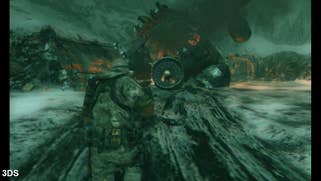

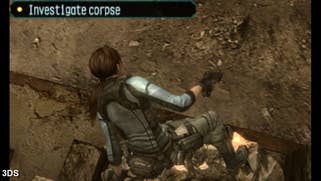
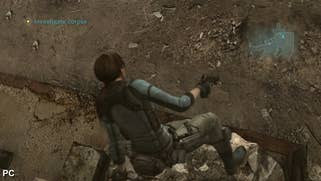
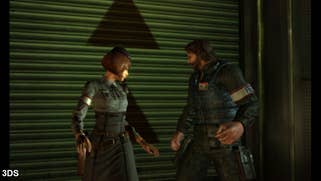

In other areas, the use of per-pixel lighting and an HDR effect on the 3DS is quite impressive, with dynamic light sources illuminating characters and the surrounding environment, although specular highlights and other surface effects are rendered via fixed-function texture layers rather than using pixel-shaders, which the 3DS simply doesn't have. Shadows are also rendered in a lower resolution than on consoles, and feature lower-quality PCF filtering.
Taking a look at overall image quality, Resident Evil: Revelations renders in 800x240 when running in 3D mode (providing 400x240 images per eye) and does so without any anti-aliasing - a standard set-up found on 3DS titles. Images are sharp and the level of depth on offer is impressive without resorting to exploring negative parallax in order to have objects regularly fly out of the screen at you.
Unlike some titles, we never felt the urge to turn the 3D off - if anything the effect makes the experience more immersive - but for those who prefer 2D gameplay, Resident Evil features an image quality boost when running in this mode. The game benefits from 2xAA, which provides coverage across the whole scene and does a very good job of addressing the jaggies, thus creating a much cleaner presentation as a result. That said, the game doesn't appear quite as crisp in 2D when displayed on the 3DS display.
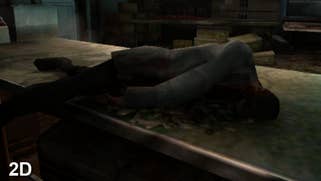
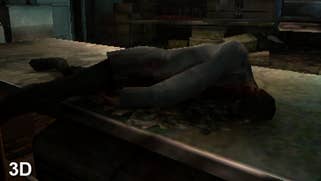
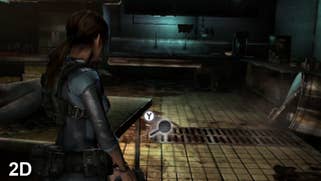
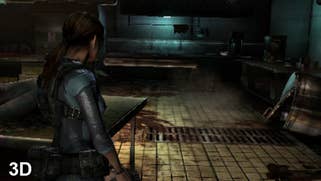


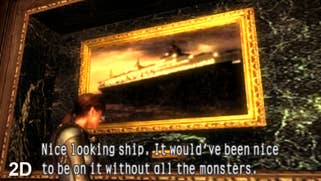

Resident Evil: Revelations - performance analysis
Compared to the recent HD Resident Evil games with their more complex environments and the sheer number of enemies on-screen, the smaller and more restrictive locations on offer in Revelations should allow for Capcom to better maintain a smoother frame-rate when the engine is under stress compared to today's graphically more demanding titles.
On the whole that is certainly the case in the HD edition of the game. For the most part we see a steady 30FPS across the 360 and PS3, with frame-rates only briefly dropping down to the mid-twenties during large boss battles that feature a larger number of enemies in screen. We see some small dips down to the high twenties on the PS3 from time to time, but this never stands out to us outside of like-for-like comparisons.
On the other hand, the Wii U version appears to be visibly less refined in this area, with small but frequent fluctuations in smoothness adding some noticeable stutter to the experience. Furthermore, frame-rates are hit harder when the engine is under load and this has a larger impact on the controls compared to on the 360 and PS3. Aiming and moving around in general feels heavier and less responsive in the Wii U - there appears to a much larger dead-zone that creates a delay between moving the analogue sticks and the action appearing on screen. Comparatively, we had no issues with button presses, so the way the controls have been programmed to the sticks seems to the the issue.
"Wii U is visibly less refined than Xbox 360 or PS3, with small but frequent fluctuations in smoothness adding some noticeable stutter to the overall experience."
This is in stark comparison to the PC, where we had no trouble running the game at 1080p60 on our Lynnfield Core i5 750 and Radeon 7870 set-up, giving this version a distinct edge over the consoles, transforming the gameplay experience with smoother frame-rates and noticeably more responsive controls. Interestingly, all versions suffer from frequent split-second pauses when loading in new areas or saving during gameplay, but these pauses have a far bigger impact in the PC game, causing frame-rates to drop noticeably for a few seconds (between 10-15FPS) - something that doesn't happen on the other versions. Your mileage may vary here, depending on hardware.
As you might expect, 3DS performance isn't quite as smooth as 360 or PS3 when the engine is under heavy load, but otherwise we are looking at a smooth 30FPS update that is hardly compromised at all outside of combat. Big boss battles cause sustained drops down to 20FPS, though, while smaller exclusions with fewer enemies see frame-rates hover around the mid-twenties.
Similarly, the use of dynamic lighting and a greater number of fixed-function effects also causes the initially solid 30FPS update to become compromised during more intense combat scenes. However, outside of these situations, the 3DS version offers up a more fluid gameplay experience than the Wii U version - a state of affairs that defies belief.
"3DS performance isn't quite as smooth as 360 or PS3 when the engine is under heavy load, but otherwise we are looking at a smooth 30FPS update that is hardly compromised at all outside of combat."
Resident Evil: Revelations - the Digital Foundry verdict
Although it's 'only' a port of a technically impressive portable game, Resident Evil: Revelations never just feels like an up-rezzed 3DS title for current-gen systems. The translation from handheld to consoles is generally excellent, with the use of higher-quality assets and the implementation of more refined visual effects allowing the game to shape up quite nicely on the home systems compare to the significantly weaker 3DS hardware. As a result, the combination of claustrophobic level design, lighting model and atmosphere all come together to form quite an engrossing experience which delivers more scares and tense scenes than other recent instalments in the series.
Overall, Resident Evil: Revelations comes highly recommended for fans of the series wanting a more traditional take on the franchise. The 360 and PS3 versions are worth equal consideration, while the PC game, despite a few hiccups, provides the most fluid and responsive experience available due to running at much higher frame-rates and without needing powerful hardware to do so. Revelations is still well worth buying on the Wii U if you don't own the other current-gen consoles - it's still the same excellent game. But the more erratic performance means and less precise controls mean that it isn't quite as fun to play.











